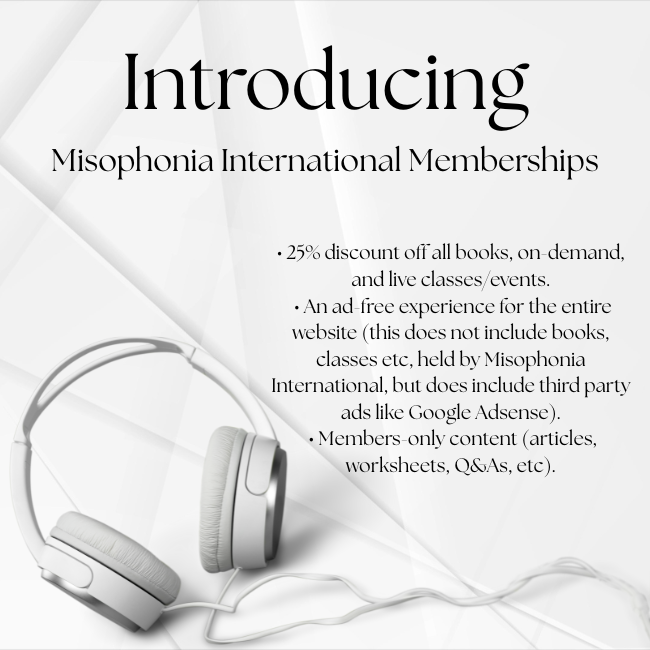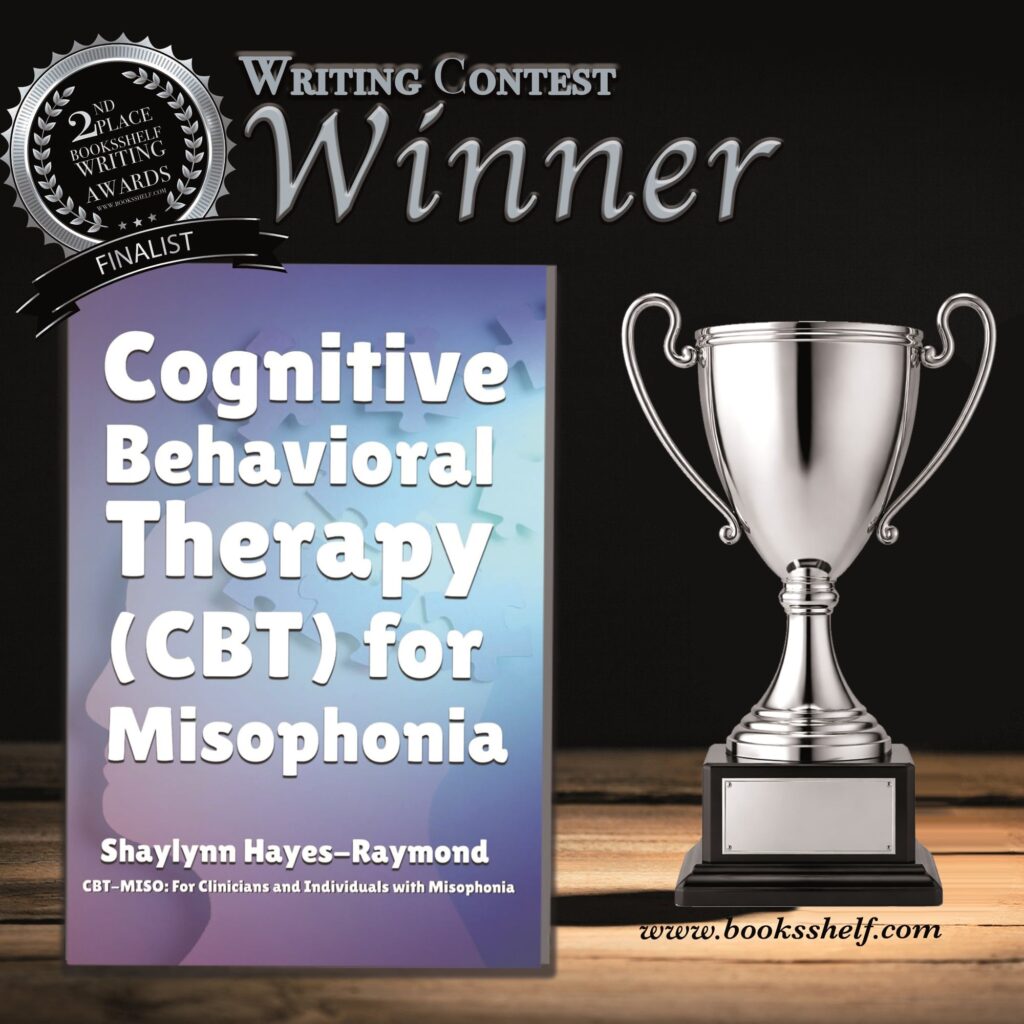
Suicide is a difficult subject to discuss for those experiencing suicidal thoughts, their families, and the people in their lives. Misophonia is believed to be a neurophysiological condition that leads to severe distress in response to everyday auditory stimuli, such as chewing, sneezing, or knuckle-cracking (Brout, 2018). Given that distress is a primary component of misophonia, it is perhaps unsurprising that studies have linked misophonia to self-harm and suicidal ideation (Edelstein, 2013; Alekri, 2019). However, despite this connection, the link between misophonia and suicide is not a frequent topic of discussion in social media or peer support communities.
In November 2016, Joyce Cohen authored a New York Post article titled “She could hear everything, and it cost her her life.” In the piece, Cohen discussed the death of Marrese, a 52-year-old historian who lived with misophonia. This was one of the first times a link between misophonia and suicide was publicly noted, yet for many years, the issue remained a quiet one within the advocacy and research communities. While this topic is still relatively overlooked by misophonia advocates, new research has emerged confirming the link between suicidal ideation and misophonia.
A study by Simner and Rinaldi concluded, “Adults with misophonia had significantly higher rates of self-harm and suicidal ideation, as well as poorer well-being in several different measures at ages 16 and 17 and 23 and 24 years. Female misophonics were particularly at risk, from as early as their teenage years, though males, too, show elevated self-harm at 24 years compared to non-misophonic peers” (2023). This risk of suicidal ideation and self-harm should serve as a significant motivator for including misophonia in diagnostic manuals and in further mental and neurological health research.
While standard suicide prevention and treatment protocols should always be followed, using a formal suicide risk assessment scale is a crucial next step. These scales provide a structured way to evaluate a client’s risk level and help in developing a safety plan. The Columbia-Suicide Severity Rating Scale (C-SSRS) is a well-known and evidence-based tool for this purpose (Columbia Lighthouse Project, n.d.). However, any validated scale would be useful. Clinicians should use these scales and, in addition to standard questions, explore how misophonic triggers and their impact contribute to a client’s suicidal thoughts. For example, a clinician might ask, “Have your thoughts of suicide increased after being exposed to a trigger sound?” or “Do your suicidal feelings stem from a feeling of hopelessness about ever getting away from these sounds?”
Coping skills for misophonia, such as CBT, are also an essential way to help individuals with the condition. CBT can be particularly effective in managing the emotional aftermath of misophonia (Jager, 2020). While there is no definitive treatment that alleviates all misophonia symptoms, support and openness are vital for raising awareness of the potential risks for people with misophonia. Although suicide is an uncomfortable topic for many, including some clinicians, it is important to avoid increasing stigma or reducing the chance of someone asking for help by remaining silent on the issue. Instead, support and awareness are critical for assisting those who are struggling with misophonia and suicidal thoughts.
If You or Someone You Know Needs Help
If you are experiencing suicidal thoughts, please remember that you are not alone, and help is available. Reaching out is a sign of strength.
For Immediate Help, Please Contact:
North America
- Canada:
- 988 Suicide Crisis Helpline: Call or text 988 anytime. Available 24/7 in English and French.
- Crisis Services Canada: 1-833-456-4566 (24/7)
- Kids Help Phone: 1-800-668-6868 (for young people)
- United States:
- 988 Suicide & Crisis Lifeline: Call or text 988 anytime. Available 24/7.
- Crisis Text Line: Text HOME to 741741
United Kingdom
- Samaritans: Call 116 123 (free, 24/7)
- Papyrus HOPELINEUK: Call 0800 068 4141, text 07860039967 (for young people)
Australia
- Lifeline: Call 13 11 14 (24/7)
- Suicide Call Back Service: Call 1300 659 467
New Zealand
- Lifeline Aotearoa: Call 0800 543 354 or text HELP to 4357
- Samaritans: Call 0800 726 666 (24/7)
Ireland
- Samaritans: Call 116 123 (free, 24/7)
- Pieta House: Call 1800 247 247
South Africa
- SADAG (South African Depression and Anxiety Group) Suicide Crisis Line: Call 0800 567 567 or SMS 31393
- Adcock Ingram Depression and Anxiety Helpline: Call 0800 70 80 90
India
- Vandrevala Foundation: Call 1860-2662-345 or 1800-2333-330
- AASRA: Call +91-22-27546669
General International Resources
- Befrienders Worldwide: Visit Befrienders.org to find helplines in various countries.
Misophonia is a serious condition that deserves recognition and effective treatment. By understanding its impact and utilizing available resources, individuals can find strategies to manage their symptoms, improve their quality of life, and mitigate suicide risk.
References
If you or someone you know is considering suicide, seek help immediately. For 24/7 assistance, call 988 for the 988 Suicide & Crisis Lifeline, or text TALK to 741741 to reach the Crisis Text Line.
Brout, J., Edelstein, M., Erfanian, M., Mannino, M., Miller, L.J., Rouw, R.,…Rosenthal, M.Z. (2018). Investigating misophonia: A review of the empirical literature, clinical implications, and a research agenda. Frontiers in Neuroscience, 12(36), 1-13. doi:10.3389/fnins2018.00036.
Edelstein, M., Brang, D., Rouw, R., & Ramachandran, V. S. (2013). Misophonia: physiological investigations and case descriptions. Frontiers in Human Neuroscience, 7(656).
Alekri, J., & Al Saif, F. (2019). Suicidal misophonia: a case report. Psychiatry and Clinical Psychopharmacology, 29(2), 232–237. https://doi.org/10.1080/24750573.2019.1597585
Columbia Lighthouse Project. (n.d.). About the Protocol. Retrieved from https://cssrs.columbia.edu/the-columbia-scale-c-ssrs/about-the-scale/
Jager, I. J., Vulink, N. C. C., Bergfeld, I. O., van Loon, A. J. J. M., & Denys, D. A. J. P. (2020). Cognitive behavioral therapy for misophonia: A randomized clinical trial. Depression and Anxiety, 38(7), 708-718.
Simner J, Rinaldi LJ. Misophonia, self-harm and suicidal ideation. PCN Rep. 2023 Oct 1;2(4):e142. doi: 10.1002/pcn5.142. PMID: 38868724; PMCID: PMC11114359.








